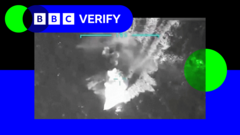Was the US Strike on the Venezuela Drug Boat Legal? Here’s What You Need to Know!

Published: 2025-09-03 16:00:36 | Category: wales
Recent US military action in the Caribbean Sea has sparked significant legal debate, as President Donald Trump announced a strike that reportedly killed 11 drug traffickers associated with the Tren de Aragua cartel. Legal experts have raised concerns about the potential violations of international human rights and maritime law surrounding the event, questioning the legality of the US's use of force against a vessel in international waters.
Last updated: 30 October 2023 (BST)
Key Takeaways
- The US strike targeted a boat allegedly linked to the Tren de Aragua cartel, claiming it was carrying drugs.
- Experts suggest the strike may violate international law, particularly the United Nations Convention on the Law of the Sea.
- Questions arise over the US's legal justification for the strike and its compliance with domestic law.
- President Trump has labelled the individuals killed as 'narco-terrorists', raising further legal and moral questions.
- The US military's legal stance on the use of force against non-state actors like drug cartels remains ambiguous.
The Incident: What Happened?
On a recent Tuesday, President Trump announced a US-led strike on a vessel in the Caribbean Sea, allegedly departing from Venezuela. The boat was said to be operated by the Tren de Aragua cartel, a group involved in drug trafficking. According to Trump, the action was necessary to prevent drugs from reaching the United States.
While Trump shared footage of the strike on social media, details regarding the operation remain sparse. US defence officials have not provided specific legal justifications for the action, leading to scrutiny from legal experts.
Legal Context: International Maritime Law
The legality of the US strike hinges on the principles established in the United Nations Convention on the Law of the Sea (UNCLOS). Although the US is not a signatory to UNCLOS, it has previously stated that its military operations should align with the convention's provisions. Under UNCLOS, nations must generally refrain from interfering with vessels operating in international waters, with limited exceptions.
Understanding Maritime Law
Maritime law governs the rights and responsibilities of states in their use of the world's oceans. Key aspects include:
- Sovereignty: States have sovereignty over their territorial waters, typically extending 12 nautical miles from their coastlines.
- Freedom of Navigation: In international waters, vessels enjoy the right to navigate freely, barring exceptional circumstances like hot pursuit.
- Hot Pursuit: This allows a state to chase a vessel suspected of violating its laws from its territorial waters into the high seas.
Experts Weigh In: Was the Strike Legal?
Legal experts have expressed concerns that the US strike may have violated international law. Professor Luke Moffett from Queen's University Belfast highlighted that while force can be used to stop a vessel, such actions should generally employ non-lethal measures unless there is an immediate threat to life. He noted that the US actions likely fall outside the bounds of lawful maritime conduct.
The Scope of Self-Defence
International law permits the use of force in self-defence, but the criteria for such actions are stringent. The UN Charter's Article 2(4) allows states to resort to force only when directly attacked. Critics argue that the US's characterisation of the Tren de Aragua cartel as engaged in irregular warfare stretches the definition of self-defence beyond its intended limits.
Professor Michael Becker from Trinity College Dublin emphasised that simply labelling individuals as narco-terrorists does not make them legitimate military targets. He pointed out that the US is not currently in an armed conflict with either Venezuela or the Tren de Aragua cartel.
Human Rights Implications
The strike raises significant human rights concerns. According to Professor Mary Ellen O'Connell from Notre Dame Law School, the killing of individuals outside the context of armed conflict is generally unlawful unless it is done to save a life immediately. The assertion that the individuals targeted were part of a drug cartel does not automatically legitimise their killing under international law.
Domestic Legal Considerations
Within the US, questions have emerged about whether the strike adhered to domestic laws governing military action. The US Constitution grants Congress the power to declare war, while Article II designates the president as Commander in Chief of the armed forces. This duality has led to debates over the president's authority to authorise military strikes without congressional approval.
Authorization of Military Force
Since the events of 9/11, US presidents have increasingly relied on the 2001 Authorization for Use of Military Force (AUMF) to justify military actions against groups deemed responsible for terrorist activities. However, the applicability of the AUMF to drug cartels like Tren de Aragua remains uncertain. Rumen Cholakov, a constitutional law expert, noted that the term 'narco-terrorists' might suggest a broader interpretation of the AUMF's scope.
War Powers Resolution Compliance
Another significant legal consideration is the War Powers Resolution, which requires the president to consult with Congress before engaging US armed forces in hostilities. The lack of clarity surrounding the strike raises concerns about whether the Trump administration adhered to this mandate.
Reactions and Defence of the Strike
Despite the criticisms, US officials have defended the strike. Senator Lindsey Graham stated that the action represents a strong stance against drug trafficking and is a sign of a new approach under the Trump administration. Other Republican senators echoed this sentiment, asserting that the operation was a necessary measure to protect American lives.
Venezuelan Response
As of now, Venezuelan President Nicolás Maduro has not directly responded to the strike. However, Communications Minister Freddy Ñáñez raised questions about the authenticity of the footage released by the White House, suggesting it may have been artificially generated. Independent analysis using AI detection tools found no evidence of manipulation in the footage.
US Naval Presence in the Region
Reports indicate that the US has increased its naval presence in the Caribbean, deploying several warships as part of anti-narcotics operations targeting Venezuela. Tracking data from publicly-available sources has identified multiple vessels in the region, including the USS Lake Erie, USS Gravely, and USS Jason Dunham.
Conclusion: What Happens Next?
The US strike against the Tren de Aragua cartel raises profound questions about the legality of military actions against non-state actors and the implications for international human rights law. As the situation develops, further scrutiny of the legal justifications and potential repercussions of such actions will continue. The debate surrounding the balance between national security and adherence to international law will undoubtedly shape future policy and military strategies.
As we move forward, it remains vital to consider how international laws evolve in response to such military actions and what measures can be taken to ensure compliance with human rights standards. In a world where drug trafficking and terrorism increasingly intersect, the challenge for nations is finding a lawful and ethical way to respond. #InternationalLaw #HumanRights #MilitaryAction
FAQs
What was the US military strike in the Caribbean Sea about?
The US military strike targeted a vessel believed to be operated by the Tren de Aragua cartel, which was allegedly transporting drugs from Venezuela to the US. President Trump claimed the operation aimed to protect American lives from drug trafficking.
Is the US strike legal under international law?
Legal experts have raised concerns that the US strike may violate international maritime law and human rights law, particularly the UN Convention on the Law of the Sea. The legality of using force against non-state actors like drug cartels is also under scrutiny.
What does the War Powers Resolution require?
The War Powers Resolution mandates that the US president consult with Congress before deploying troops into hostilities. Questions surrounding compliance with this resolution have arisen in the context of the recent strike.
What is the stance of Venezuelan officials on the US strike?
Venezuelan officials, including Communications Minister Freddy Ñáñez, have suggested that the footage of the strike may be manipulated and have not provided a detailed response to the incident. President Maduro has not directly commented on the strike as of yet.
How has the US increased its military presence in the Caribbean?
The US has reportedly deployed several naval warships to the Caribbean to support anti-narcotics operations targeted at Venezuela. Tracking data has identified multiple vessels operating in the region.


